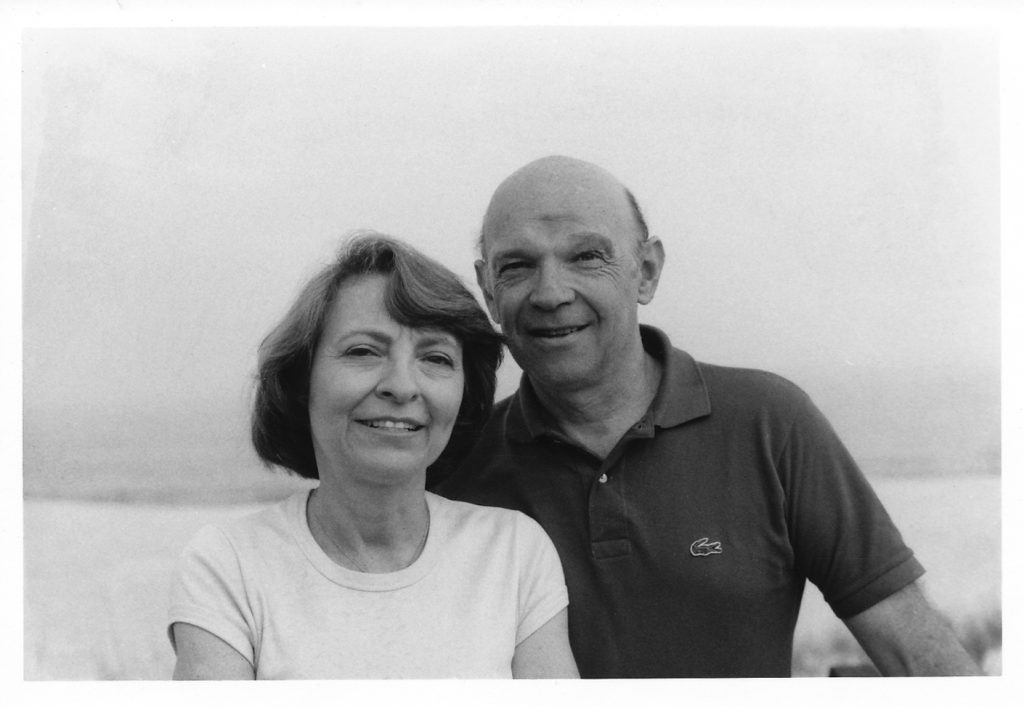As I write this, a storm is moving in. The sky has turned an angry shade of purple-gray, and thunder rumbles frequently, close enough to reach me through windows closed against the oppressive heat, but far enough away that the house doesn’t yet tremble with each clash. The rising wind and first huge raindrops cool the air — welcome relief. Lightning flickers, and I hunger for the sweet, clean scent of ozone and fresh rain. I leave my computer to step outside for a few moments.
As a small child, I was frightened by thunder. I suppose most kids are. My father would come into my room during nighttime storms and sit with me, both of us counting the intervals between lightning flashes and thunder’s response. With his help, I overcame my fear and grew to love thunderstorms as much as he did. A gift. One among so many, more than I could possibly count.
Afternoon storms were a staple of Mid-Atlantic summers, reprieves from the hot and hazies of my native New York. We thought those days brutal, scorching. Little did we know what the future would hold for a climate-altered world. But I remember — as a boy and then a teen — going outside onto our front steps to watch storms roll in, much as I did just now. If my brother Jim was around, he would join me, and we would scan the sky, watching for forks of lightning, savoring the caress of splattered rain.
Years later, he and I would have a different sort of thunderstorm experience, in a cirque above tree line in California’s King’s Canyon National Park. We had planned a hiking trip into the backcountry, biting off far, far more than we could chew. Our first day of hiking was too strenuous for both of us — miles of steady, steep uphill walking, both of us carrying forty-plus pounds of gear on our backs. In the middle of the afternoon, storms rolled in, the Sierra Nevada sky churning. We had no choice but to take shelter, though by that point we were surrounded by low, stunted pines, huge boulders, snowfields, and little else. We got soaked, decided to make camp there so we could dry out. But as night fell, more storms moved in, and one of the cells settled directly over our campsite. Roars of thunder followed right on the heels of brilliant flares of lightning. And we huddled in a tent — one of those old ones, held up by metal poles. Frankly, we were fortunate to survive the night. We woke up to fog, fresh snow, and temperatures way less than half what they’d been when we left our car the previous morning.
Nancy grew up on a dairy just outside of Boise, Idaho, and we still go back to the Boise area to visit her dad, her brothers, and our nieces and nephews. That part of Idaho is essentially sagebrush desert reclaimed through irrigation, and though mountain ranges loom in the distance, much of the landscape between Boise and the Snake River is flat. So when thunderstorms move through the area, there is nothing to mute the sound or block one’s view. Miles from where one stands, daggers of lightning stab the terrain. And thirty or forty seconds might pass before thunder growls in reply, an afterthought, surprisingly clear and loud.
Shortly before Nancy and I left California to move to Tennessee, we paid one last visit to Yosemite National Park, one of our favorite places. It was a gorgeous early summer day, and though we’d made a point of going in the middle of the week, the park was still unbelievably crowded, as it usually is. We spent a little time in Yosemite Valley, but the crowds were worst there, so we passed most of the day in the higher elevations around Tuolumne Meadows, an area of dramatic mountain vistas, deep evergreen forests, and rolling alpine meadows. As is the theme of this post, a series of thunderstorms rampaged through the park that day, bringing high winds, pelting rain, and a fusillade of grape-sized hail that I feared would shatter the windshield of my old Toyota Corolla. I didn’t have much experience with hail at that point in my life, and in the middle of the storm, curious and foolish, I opened the car door (we were parked at a viewpoint) and stuck my hand out. The little buggers hurt, and when I said “Ow!” Nancy looked at me as if I was the dumbest guy on the planet and just said, “Well, yeah.”
There have been lots of other storms of course. When we reached Tennessee, we realized that thunderstorms are different in the Southeast. Some spring and summer nights, the sky flashes continuously for hours at a time, and thunder claps are so frequent they overlap to form an unceasing grumble. I’ve never experienced this anywhere else. It’s one of my favorite things about living here.
The storm that began as I started writing this has continued. Rain still falls, the sky glimmers and thunder echoes across the hollow in which we live. But the hummingbirds are feeding again, so maybe they sense fairer skies heading this way.
I wish you a week of cooling rains, dramatic skies, and fair winds.









 “This is my present,” he said. “Watching all of you.”
“This is my present,” he said. “Watching all of you.”